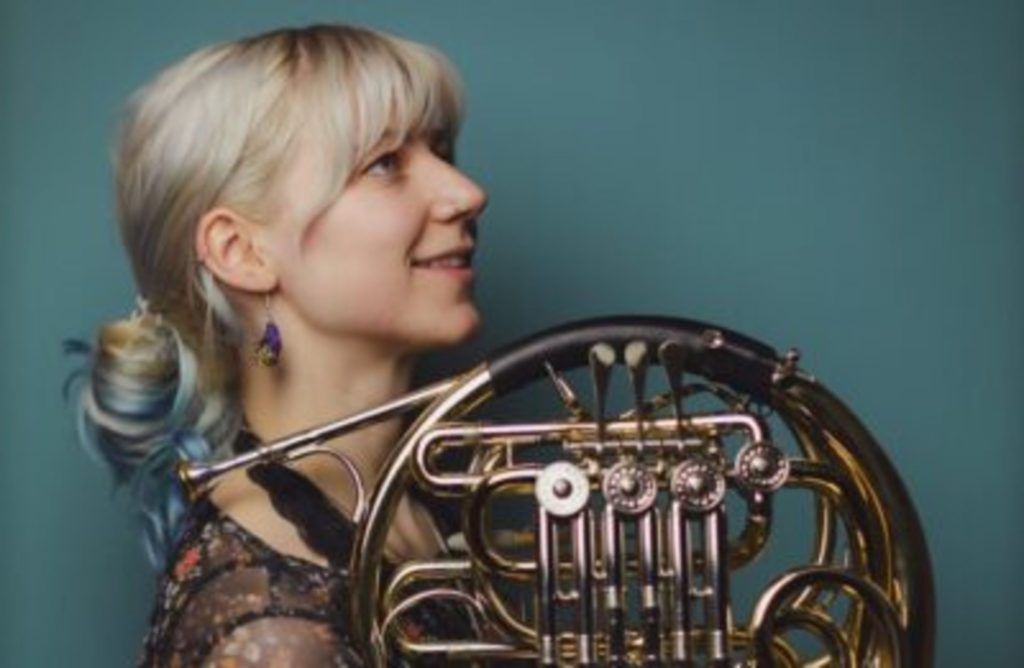
THE recital opened with Eugène Bozza’s En Forêt. This was written as an examination piece for the Paris Conservatory in 1941, and it showed.
The demands in this virtuosic work are considerable, and Zoë Tweed treated us to a masterclass in horn technique covering: agility, range, lip trills, hand stopping, fast tonguing, control of extreme registers and glissandi.
I thought it took a moment or two for Ms Tweed to get into the groove, but maybe it was my ear getting acclimatised to the natural harmonics. But the performance showed that En Forêt works perfectly fine as a duet. It was atmospheric and full of life and the piano accompaniment was quite impressionistic. The obligatory call and response hunting calls or tropes added a sense of fun, for me anyway.
In complete contrast to En Forêt, Jean-Michel Damase’s Berceuse is a short, relaxed affair. I thought the performance was enjoyable, but the piece itself didn’t really contribute much to the programme. And to be honest, the same could be said of Charles Koechlin’ s 1925 Sonata for Horn and Piano (1st Movement). The performance did deliver a simple, even quite serene Moderato (sounding more like a traditional Andante).
Sat in between the two was the more interesting Tre Poemi: Lamento D’Orfeo by Volker David Kirchener. The piece is Romantic, well, in its character anyway, but embraced a modernistic style regarding both horn colour and technique. This was evident right at the opening, Ms Tweed pointing the bell of the horn at, or into the open piano lid, with the effect of using the piano’s soundboard and sustaining pedal to lengthen the horn notes.
The duo closed the first half with a fabulous performance of Paul Dukas’s Villanelle. This too was written as an exam piece, but the technical challenges – stopped notes, fast scales, playing without valves using natural horn techniques – were secondary to the piece of music itself.
I absolutely loved the delightful sharing of the musical spoils, warm and sunny with ripples of brilliance. This was easily the most rewarding horn and piano work in the programme.
Astor Piazzolla’s Ave Maria proved to be a cosy introduction to the second half with fine playing from both performers. Wolfgang Plagge’s Monoceros is a piece for solo horn about the legendary unicorn, an animal everybody has heard about but mercifully never seen.
Zoë Tweed delivered an evocative, technically flawless performance; the cute ending depicting the unicorn disappearing into the legendary mists was just lovely. However, I found the piece itself pretty underwhelming; each to our own, I know.
The programme closed with York Bowen’s Horn Sonata, Op. 101. This is a seriously well-crafted work, which in itself is rewarding. Of the three movements, it was the energetic Allegro con Spirito finale that really impressed.
The players were clearly relishing the challenges; wide interval leaps with an evenness of tone (horn) and dazzling ‘orchestral’ textures (piano). What stayed with me was the distinctive timbre of the horn’s low register.
There was a touching mother (Karen Street) and daughter (Zoë Tweed) signing-off, Epilogue. The work was a composed as a tribute to the Prologue in Britten’s Serenade for Tenor, Horn and Strings.
This concert clearly demonstrated what an exceptional performer Zoë Tweed is. But without doubt the best and most satisfying contribution came from pianist Mark Rogers’ playing of the two Schumann selections from Kinderszenen, Op.15 and Waldszenen, Op. 82. Well, it is Schumann after all, and Mr Rogers played them beautifully.
Review by Steve Crowther
